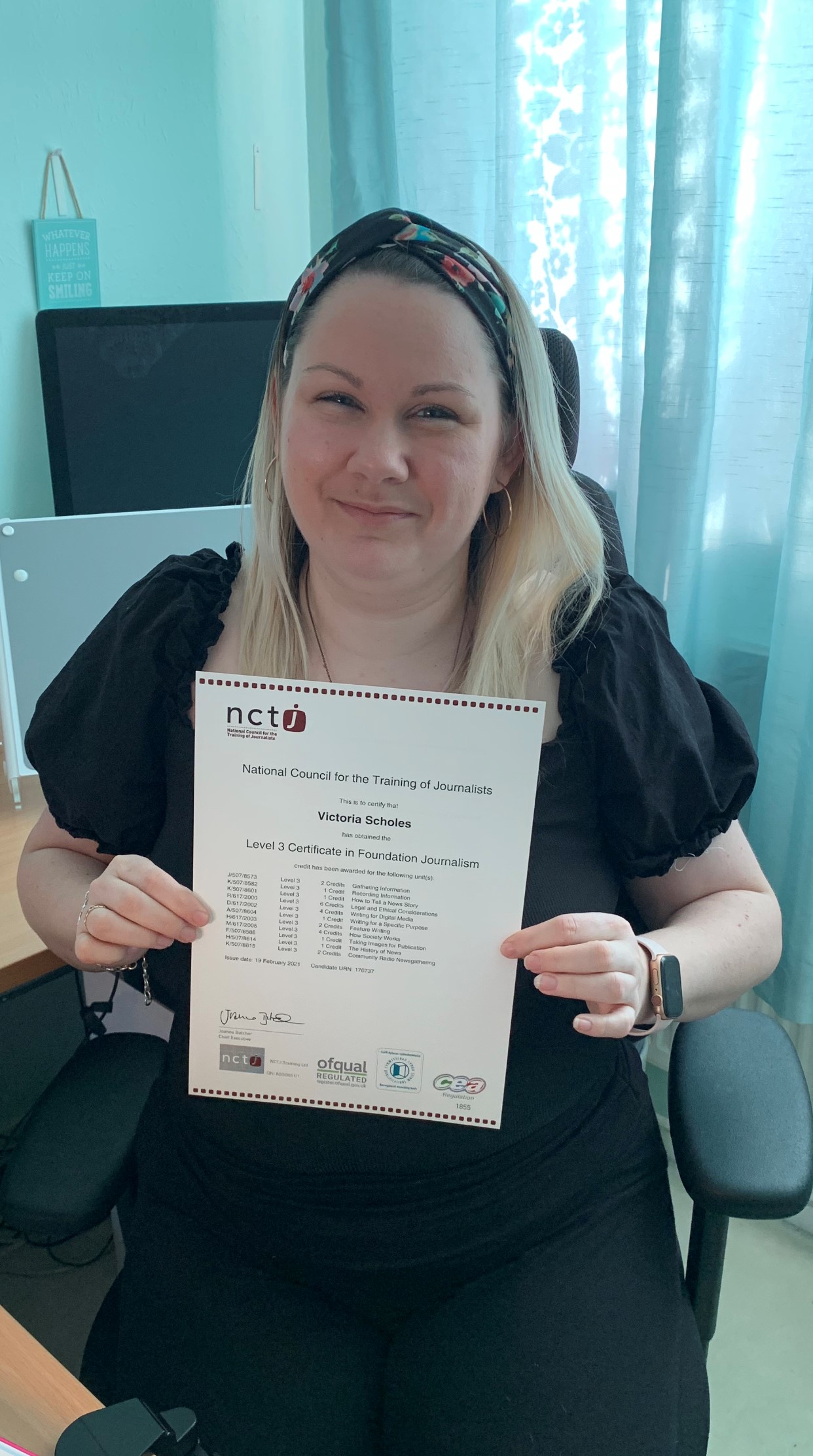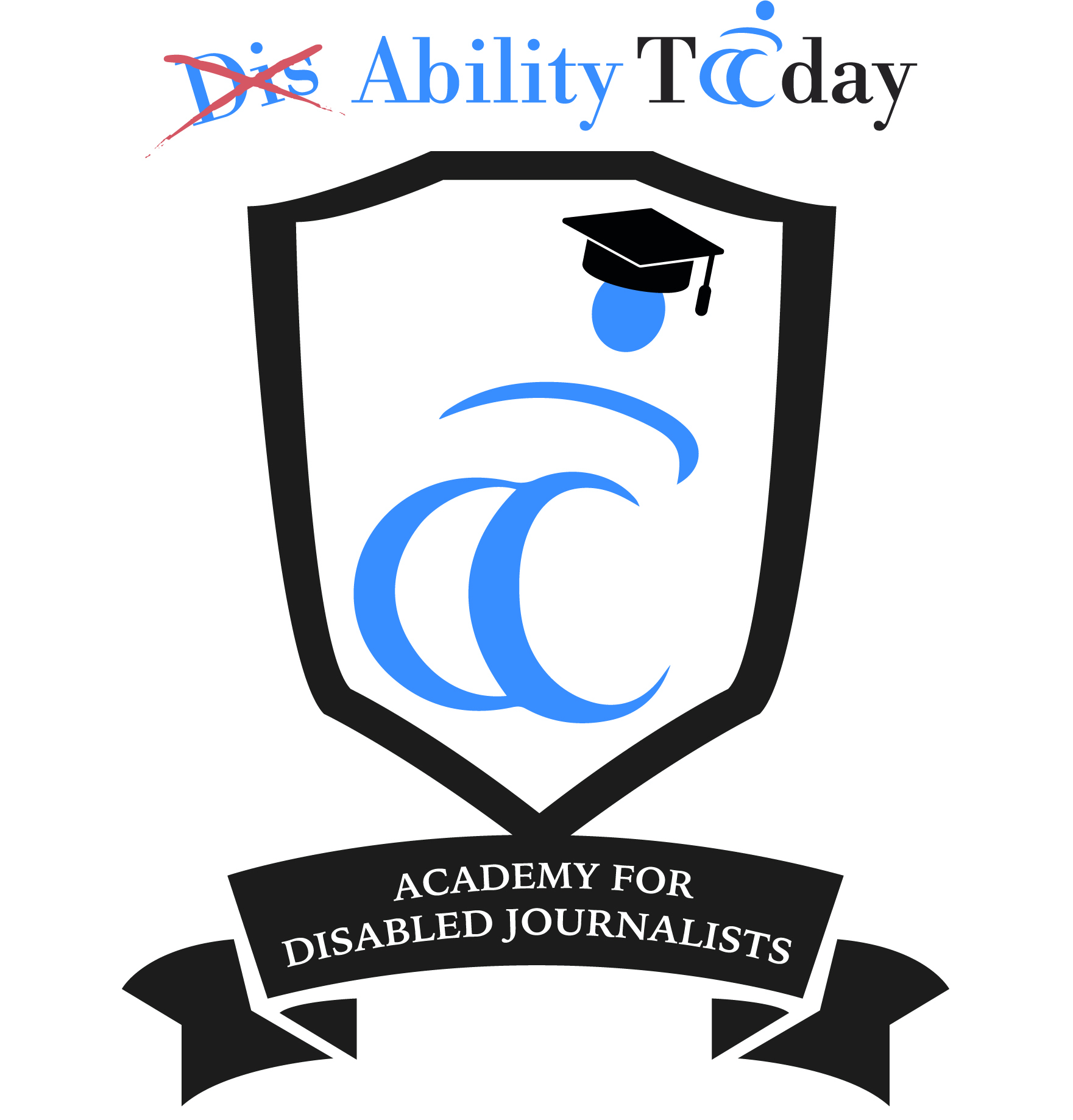Ability Today and NCTJ student celebrates Certificate in Foundation Journalism success
Victoria Scholes has become the first student from Ability Today’s Academy for Disabled Journalists to pass the NCTJ Certificate in Foundation Journalism (CFJ).
Victoria Scholes has become the first student from Ability Today’s Academy for Disabled Journalists to pass the NCTJ Certificate in Foundation Journalism (CFJ).
 The NCTJ partnered with social enterprise Ability Today in 2020 to launch an introductory course for aspiring journalists with disabilities.
The NCTJ partnered with social enterprise Ability Today in 2020 to launch an introductory course for aspiring journalists with disabilities.
Thirteen students with varying disabilities enrolled on the course, which has been delivered remotely through a combination of the NCTJ’s Journalism Skills Academy platform and interactive online video classes. The students are the first cohort to be attached to Ability Today’s Academy for Disabled Journalists.
Victoria passed all of her assessments first time, and has now achieved the level three NCTJ qualification.
She said: “I am really happy to have passed, it feels like a great achievement and to know I did it first time means that it can be done.
“I might be disabled, and my body may let me down but that does not mean my brain does not work. It takes a lot more than that of an average person to get where I am, and lots of hard work and I need a lot of assistance, but it shows that just because you are disabled you can still achieve things.
“Ability today have been so supportive of my needs and studying in a group of people who understood me helped me to succeed. If you too are interested in journalism and have a disability, contact Ability Today, they will give you the tools and support to achieve your goals.”
 Grant Logan, founder of Ability Today, said: “I am delighted that we have our first qualified student with the Certificate in Foundation Journalism.
Grant Logan, founder of Ability Today, said: “I am delighted that we have our first qualified student with the Certificate in Foundation Journalism.
“We’re so proud of Victoria’s achievement, she has shown that anything is possible and has completed her first step on her media career. We look forward to supporting Victoria with the next stage of her journey.”
Nikki Akinola, diversity and inclusion co-ordinator at the NCTJ, said: “It is fantastic to see this initiative bearing fruit. Working with Ability Today has been both a valuable and important experience. Seeing the students make advances in their journalistic knowledge is what this scheme is all about.
“We look forward to seeing more students complete their qualification in the months ahead, and we can’t wait to see what the future has in store for Victoria.”
We spoke to Victoria about her experience on the course, and what she plans to do next:
What made you want to study journalism?
I have always had a passion for writing, and at the age of 12 I had my poems published in the Young Writer’s poem books. I have since gone on to gain my law degree and found myself as the news editor of the universities law society. You could say I fell into it, but I would spend ages searching social media for stories and keeping up-to-date with cases and new legislation. I couldn’t wait to write about them and tell the world the news.
Being in a wheelchair you realise that there are a lot of injustices out there and when I started to write news stories about disabled people in law, or anything to do with disabled access to the law, people would listen and come through to me and say thank you. It was then I realised journalism was more than writing about news. It could also be my voice.
Tell us a bit about your experience on the course, what did you enjoy the most?
I joined the course after a friend sent me the advertisement. I sent an email on the Thursday, spoke to Grant from Ability Today on the Monday, said yes on the Tuesday and started on the Wednesday – so it was all a whirlwind. I was cautious at first, but everyone was lovely, and I felt so at home. To be accepted for who I was, it did not matter that my head would twitch, or I couldn’t get my words out as we were all in the same boat. I felt at home. The weekly sessions really helped keep me on course and Vanessa the tutor really brought things to life. What I loved most was being accepted for me, disabilities, and all.
The course itself taught me the different writing styles available out there. From feature writing and news articles to blogs.
I enjoyed learning about the different types of journalism. When you think about the word journalism the first thing that jumps into your head is the press and newspapers. The course opened my eyes to radio and video and when it came to the radio bulletin module, I kind of fell in love with it.
Which new skills have you found particularly valuable?
The skill I have found most valuable is adapting my writing style for my audience and the type of writing I am producing. So, if I am writing for my blog I am much more relaxed and talk more from personal experience. However, to write a feature piece is about getting into the mind-set of the person or topic you are writing about, getting a real sense of what your audience wants to know about this person and what they would find most interesting and then channelling your focus on that area. It could be something as simple as a celebrity Olympian telling you that whilst training, they eat six hamburgers a week. From then on it is no longer a main focus on the training but the headline changes to Olympian eats six hamburgers a week in run up to Olympics.
How did it feel when you found out you had passed the qualification?
I was totally shocked at first to be honest, all my work which I submitted in three batches passed first time. I really expected at least one of the units to come back as failed with some feedback. I could not even look at the results when they came in and peeked through my fingers. I was stunned.
I am really happy to have passed, it feels like a great achievement and to know I did it first time means that it can be done.
Do you plan to continue in journalism?
Yes definitely, I am hoping to continue on to the diploma and hope with the backing of the NCTJ and Ability Today that this can be achieved. As the course has shown, people with disabilities can achieve this qualification, there are many more behind me, my peers, that will get this qualification as well. But there have to be things put in place to support us, with that help we can make a difference. I do want to continue and will continue, even after my diploma I want to go into some sort of journalism that helps support other disabled people and make a difference in the country. What area that will be in, I am not yet sure, I feel I need to explore more areas, but I love to write so whether it is writing about experiences, or writing for disabled companies, I am not yet sure.
Do you have any advice for anyone considering studying the CFJ?
I would not hesitate to do this course if you are considering it. If you are interested in journalism at all, it will open your eyes to a whole way of writing, it will teach you the law of what you can and cannot do. It may surprise you and show you an area of journalism you did not even think you would like but you instantly fall in love with.
It does not just teach about writing, it teaches camera angles, how to take a good picture, videos, how to take a photo for Facebook or Instagram. It changes how you look at things in everyday life.
Was I hesitant in the beginning? Yes, I will not lie it’s something new and that can be scary, but now, it’s changed my life and I am so glad I started this course as it has opened up new beginnings for me. I wanted to achieve things in life, I wanted to champion disabled people who were being left behind and I did not know how. Then I started this course not knowing where it would lead, and it has led me right to where I want to be. Sometimes the things we least expect lead us to where we are supposed to be in life.

